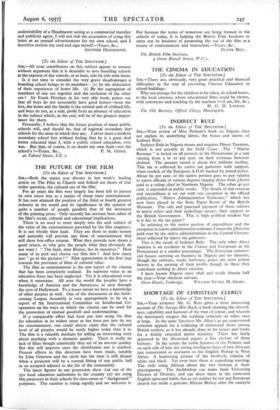INDIRECT RULE
[To the Editor of THE SPECTATOR.]
Sta,—Your review of Miss Perham's book on Nigeria does not explain its underlying fabric, the bones and sinews of Indirect Rule.
Indirect Rule in Nigeria means and requires Direct Taxation, which is not payable in the Gold Coast. The " Native Revenue " is levied on all persons in the Protectorate at a rate varying from 5 to to per cent on their revenues however derived. The amount raised is about two millions sterling. This tax is collected by native tax gatherers with support, when needed, of the European A.D.O. backed by armed police. About 6o per cent. of the native portion goes to pay salaries to native officials of various degrees ranging down from £8,000 paid to a ruling chief in Northern Nigeria. The other 4o per cent. is expended in public works. The details of this revenue and expenditure is set out with one exception in the official publication, " Native Administration Estimates," which has now been placed in the State Paper Room of the British Museum. The safe and punctual payment of these salaries to native rulers and their underlings secures their support to the British Government. This is high political wisdom but is it fair to the tax payer ?
In referring .to the native portion of expenditure and the exception in native administration estimates I mean the L800,000 paid over by the native administrations to the Central Govern- ment collected by native tax gatherers.
This is the result of Indirect Rule. The only other direct taxation is on residents in the Colony and Europeans in the Protectorate at a smaller percentage. The European commer- cial houses carrying on business in Nigeria pay no taxation, though the railways, roads, harbours, police are most potent factors in the earning of their profits though to these they contribute nothing in direct taxation.
I have known Nigeria since 1898 and reside therein half the year.—Your obedient servant, Oxon Hoath, Tonbridge. WILLIAM NEVILL M. GEARY.






































 Previous page
Previous page